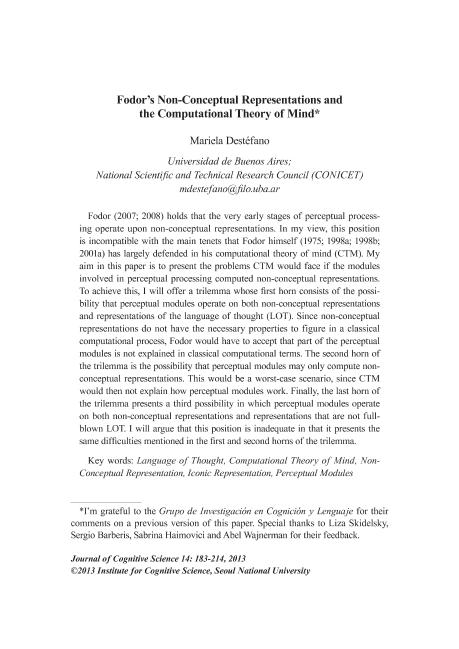Artículo
Fodor's non-conceptual representations and the computational theory of mind
Fecha de publicación:
05/2013
Editorial:
Seoul National University. Institute for Cognitive Science
Revista:
Journal of Cognitive Science
ISSN:
1598-2327
Idioma:
Inglés
Tipo de recurso:
Artículo publicado
Clasificación temática:
Resumen
Fodor (2007; 2008) holds that the very early stages of perceptual processing operate upon non-conceptual representations. In my view, this position is incompatible with the main tenets that Fodor himself (1975; 1998a; 1998b; 2001a) has largely defended in his computational theory of mind (CTM). My aim in this paper is to present the problems CTM would face if the modules involved in perceptual processing computed non-conceptual representations. To achieve this, I will offer a trilemma whose first horn consists of the possibility that perceptual modules operate on both non-conceptual representations and representations of the language of thought (LOT). Since non-conceptual representations do not have the necessary properties to figure in a classical computational process, Fodor would have to accept that part of the perceptual modules is not explained in classical computational terms. The second horn of the trilemma is the possibility that perceptual modules may only compute nonconceptual representations. This would be a worst-case scenario, since CTM would then not explain how perceptual modules work. Finally, the last horn of the trilemma presents a third possibility in which perceptual modules operate on both non-conceptual representations and representations that are not fullblown LOT. I will argue that this position is inadequate in that it presents the same difficulties mentioned in the first and second horns of the trilemma.
Archivos asociados
Licencia
Identificadores
Colecciones
Articulos(SEDE CENTRAL)
Articulos de SEDE CENTRAL
Articulos de SEDE CENTRAL
Citación
Destéfano, Mariela Natalia; Fodor's non-conceptual representations and the computational theory of mind; Seoul National University. Institute for Cognitive Science; Journal of Cognitive Science; 14; 2; 5-2013; 183-214
Compartir




